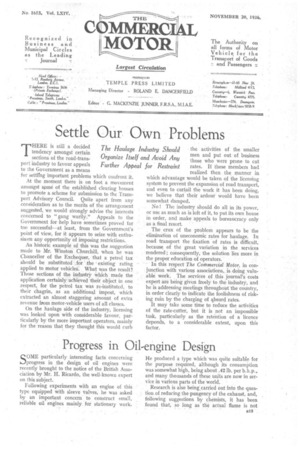Settle Our Own Problems T HERE is still a decided tendency
Page 27

If you've noticed an error in this article please click here to report it so we can fix it.
amongst certain sections of the road-transport industry to favour appeals to the Government as a means for settling important problems which confront it.
At the moment there is on foot a movement amongst spme of the established clearing houses to promote a scheme for submission to the Transport Advisory Council. Quite apart from any consideration as to the merits of the arrangement suggested, we would strongly advise the interests concerned to "gang warily." Appeals to the Government for .help have sometimes proved far too successful—at least, from the Government's point of view, for it appears to seize with enthusiasm any opportunity of imposing restrictions.
An historic example of this was the suggestion made to Mr. Winston Churchill, when he was Chancellor of the Exchequer, that a petrol tax should be substituted _for the existing rating applied to motor vehicles. What was the result? Those sections of the industry which made the application certainly achieved their object in one respect, for the petrol tax was re-instituted, to their chagrin, as an additional impost, which extracted an almost staggering amount of extra revenue from motor-vehicle users of all classes.
On the haulage side of the industry, licensing was looked upon with considerable favour, particularly by the more important operators, mainly for the reason that they thought this would curb the activities of the smaller men and put out of business those who were prone to cut rates. If these members had realized then the manner in which advantage would be taken of the licensing system to prevent the expansion of road transport, and even to curtail the work it has been doing, we believe that their ardour would have been somewhat clamped.
No I The industry, should do all in its power, or use as much as is left of it, to put its own house in order, and make appeals to bureaucracy only as a. final resort.
The crux of the problem appears to be the elimination of uneconomic rates for haulage. In road transport the fixation of rates is difficult, because of the great variation in the services rendered ; consequently, the solution lies more in the proper education of operators.
In this respect The Cothrnercial Motor, in conjunction with various associations, is -doing valuable work. The services of this journal's costs • expert are beink given freely to the industry, and he is addressing meetings throughout the country, in order clearly to indicate the foolishness of risking ruin by the charging of bsurd rates. It may take some time to reduce the activities of the rate-cutter, but it is not an impossible task, particularly as the retention of a licence depends, to a considerable extent, upon this factor.




























































































